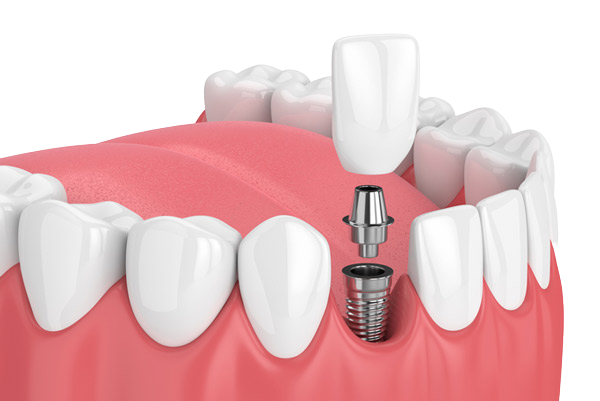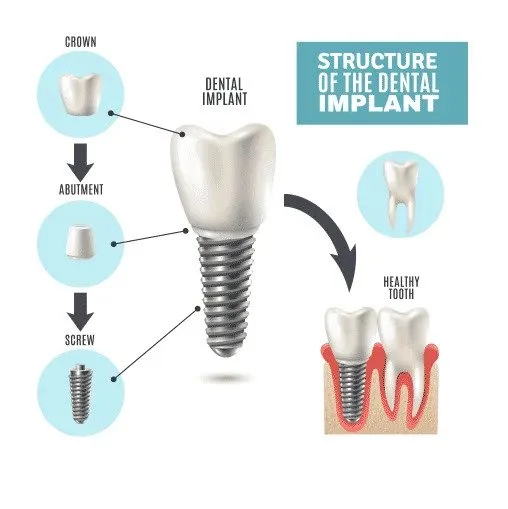
Dental Implants in Peoria, AZ
Dental Implants
Cost $2,985.00
Or Finance for:
Zero-Down, Up to 48 months, 99% Approved. Dental Implant Price Break Down
Consultation
Free
Includes Treatment Plan, Limited Time OfferCrown
$995.00
Same Day In-House Lab Dental Crown1 Implant
$1,495.00
Implant Placement Only. Includes Full Mouth X-RayImplant Abutment
$495.00
Cutting Edge Computer Guided TechnologyTotal
$2,985.00
Our clinic uses the latest advances in dental implant procedures in order ensure superior lifelong results
Dental Implants in Peoria, AZ
If you’re among the 180 million Americans who are missing one or more teeth, you don’t have to live with it.
Dental implants from Gary Gwilt, DMD, and the team at Tooth Corps in Peoria, Arizona, restore your smile and tooth functioning.
Schedule a free consultation to discover your options at Tooth Corps
Contact Us
Fill out the form to get your consultation scheduled.
Dental Implants Q&A
-
Dental implants are the strongest and longest-lasting option for replacing missing teeth. A dental implant places an artificial tooth root into your jaw and an artificial tooth on the gumline. The new tooth looks, feels, and performs exactly like your natural teeth.
Dental implants can replace a single missing tooth or multiple teeth with either dental crowns, bridges, or dentures. Once in place, implants improve your smile and self-confidence while making it easier to bite and chew your food.
-
At your implant consultation, the team at Tooth Corps uses advanced cone beam computed tomography (CBCT) technology to produce three-dimensional images of your teeth, gums, nerve pathways, and jawbone. This allows Dr. Gwilt to determine if you’re a candidate for dental implants and ensures proper placement of your implant.
Dental implants require oral surgery with Dr. Gwilt, a fellow of the International Congress of Oral Implantologists who has an extensive implant and oral surgery experience. At your appointment, anesthesia keeps you comfortable while the implant is inserted into your jaw in place of the missing tooth.
Once the implant is in place, your jaw needs a few months to heal. After your implant fuses to your jaw, you return to Tooth Corps for the placement of your crown, bridge, or denture to restore your appearance and functioning. -
Dental implants offer a nearly permanent solution to replacing missing teeth. Removable dentures can cause discomfort or make it difficult to eat, while dental implants stay firmly in place.
In addition to offering a strong and aesthetically pleasing tooth replacement, dental implants prevent oral health problems associated with missing teeth. For example, missing teeth can cause other teeth to move into the spaces, leading to crooked teeth and making it difficult to keep them clean.
When you have missing teeth, you’re more likely to grind or clench your teeth, which causes jaw pain and tooth damage. Replacing missing teeth closes the gaps to keep your teeth from moving out of place, and it also reduces your jaw pain.
To find out if dental implants can restore your smile and replace your missing teeth, call Tooth Corps or make an appointment online today. -
Tooth Corps offers dental implant specials to make tooth restoration as affordable and accessible as possible. Single tooth implants including the exam, X-rays, crown abutment, and implant are priced at $2,100, while a full mouth implant restoration starts at $14,000.
Dental Implants In Phoenix, AZ
Permanent solution for tooth loss.
How Permanent Are Dental Implants?
The question of how long a dental implant lasts is an important one. You may have heard that the average lifetime of a dental implant is twenty-five years or more. This is true as long as proper care is done to maintain them. Just like your natural teeth, a variety of factors influence their lifetime. These factors include:
✓ How well you follow a regular dental maintenance routine, such as daily flossing, brushing, and seeing a dentist every six months.
✓ Avoid chewing or biting down on hard items, like pen tips or pencils, and avoid opening things with your teeth.
✓ The skill of the dentist that placed the implant. Experts should be certified and knowledgeable of the best practices and be monitoring the process of osseointegration, or how well the implant is connecting to the jaw.
✓ Your lifestyle (such as not smoking or smoking) and overall health.
A dental implant is a support structure anchored in the jaw to strengthen a tooth replacement. This method requires surgery with a substantial level of expertise and cosmetic dental experience. Prosthodontists who can perform such a procedure are specialized and in high demand in the Phoenix AZ area. This procedure inserts the implant into the jawbone, where the bone and the implant structure fuse over time. This connection creates an extension of the jawbone which can support and secure a dental prosthetic.
Who would be a Good Candidate for a Dental Implant?
Patients that require dental implants must have good overall dental health. Some factors in deciding whether a patient is a suitable candidate include:
✓ Gum disease
✓ Diabetes
✓ Smoking habits
✓ Osteoporosis
✓ The degree of tooth decay
✓ Supportive jaw bones
✓ Bone size and structure
✓ The health of adjacent teeth
✓ The health of mucous membranes
✓ The location in the mouth
✓ Teeth Grinding
Use of bone-building drugs
Incorporating a foreign material into the body can have a high failure rate. To guarantee the most successful outcome of this complex surgery, the patient must meet all essential criteria to ensure the implant will not be rejected.
Dental Implant Procedure
Once the dentist has made molds of the patient's bite pattern for the tooth bridge or denture, there are five necessary steps required for successful fusion of the implant. The following is a general synopsis of what each patient can expect when undergoing a dental implant procedure.
Incision
After the dentist administers a substantial amount of anesthesia, the dentist will make a deep incision along the center of the gumline, directly above the jawbone. The gum tissue is separated and pulled back to expose the bone underneath. The site of the incision is essential to allow for the gum tissue to wrap around or even cover the implant after insertion.
1st Drilling
The first drill is where a highly qualified dentist is crucial. Dr. Gwilt will use a high-speed drill to place a tiny hole in the bone. The process requires expertise and precision so the hole does not damage or burn the bone, which could also damage the gum tissue.
2nd Drilling
After the first hole has been created, the dentist will continue to drill at a much slower speed using progressively larger drill bits. When the cavity has reached an optimal size for the implant, the drilling is complete. During this step, careful attention is needed to keep the heat low during drilling to avoid nerve or cell damage.
Dental Implant Placement
The implant is screwed into the hole with a pressure sensitive wrench intended to limit over-tightening or undue stress to the surrounding tissue and bone.
Cavity Closure
Once the implant is screwed into the bone, the soft gum tissue is brought back together to surround the implant either leaving the top exposed or covering it completely. The option between covering the implant entirely or allowing it to pierce through the surface gum tissue depends on the type of prosthetic tooth the will be installed.
What Types of Prosthetics can be Installed onto the Implant?
Once the implant procedure is complete, there are different options of prosthetic types that can be attached to the abutment, a connector to the implant. Dr. Gary Gwilt and his team located in Phoenix AZ have several years of experience connecting crowns, dentures, and fixed bridges to implant supported abutments. For multiple tooth prosthetics, the patient may require more than one implant to support the structure. The prosthetic can be further supported by adjacent teeth when anchoring a bridge. This type of bridge is fixed and cannot be removed by the patient. The bridge structure can vary between two prosthetics to a full row, equivalent to a denture. There are also dentures which the patient can remove. These prosthetics have a connector at the anchor points or the abutment itself, allowing the patient to remove the denture easily.
The recovery process can vary between several weeks to months, depending on how quickly the patient heals. The principal goal of cosmetic dentists is to obtain osseointegration with the initial implantation. Osseointegration is the result of the implant successfully fusing to the bone structure, which can occur naturally over time when the implant is inserted correctly and not rejected by the body. The process can take as long as six months to guarantee necessary implant stability. After the implant is secured, the dentist can install a prosthetic tooth, bridge, or denture.
Signs that an implant is securely fused to the bone include a lack of:
✓ Movement
✓ Pain
✓ Bleeding
✓ Bone loss
The dental implant procedure is not major surgery, but allowing for ample time for the implant to fully fuse to the bone is crucial to a healthy and stable prosthetic. Bone growth is slow but vital to the success of preventing the implant from any movement. Dr. Gary Gwilt and his team in Phoenix AZ are committed to their patient's long-term success, in which every effort is made in the care and stabilization of the dental implant. If you are located in the Phoenix AZ area and require cosmetic dental work, you will find comfort in the care and precision of Dr. Gwilt and his staff.
Location
13660 N. 94th Drive, Suite B-1
Peoria, AZ 85381
Book Now!
Monday - Friday
9AM - 5PM
(623) 200-5605
Feedback?
Share your thoughts to assist us in getting better.



